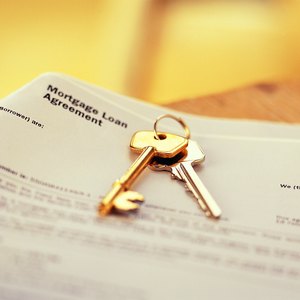
Creating a voluntary lien on real estate usually means granting a mortgage to a lender. How this is done depends upon the purpose of the loan itself, whether you're using the mortgage loan to buy, improve or refinance the property, or whether the loan has some unrelated purpose such as a business loan that requires collateral. In either instance, you'll need a mortgage document prepared, and the mortgage will need to be recorded with the county.
Tips
To grant a voluntary lien on a house, execute a mortgage document for the lender to record with the recorder or register of deeds in the county where the property is located.
What Is a Lien?
A lien is an interest in property held by someone to whom the property owner owes money. A lienholder doesn't own the property; rather, a lienholder has certain rights to the property if the property owner doesn't repay the money owed. For example, if you buy a car and take out a loan to pay for it, the lender will require you to give a lien on the car. If you don't pay your car payment as agreed, the lender can repossess the car and sell it.
Liens can be voluntary or involuntary. Involuntary liens include things like tax liens and judgment liens; voluntary liens include car liens and mortgage liens.
Voluntary Liens vs. Involuntary Liens
Involuntary liens, such as tax liens and judgment liens, attach to real estate without the owner's permission. These types of liens generally attach when the property owner defaults on a payment obligation. For instance, if you don't pay your property taxes, the city or county automatically gets a lien on the house for the unpaid balance, and the lien stays until the taxes are paid. If someone sues you and gets a judgment against you, depending on your state's law, the judgment may create a lien on any real estate you own within the county or state.
Voluntary liens are, as the name suggests, voluntary, and created by agreement. A home mortgage is a very common type of voluntary lien.
Specific Lien Definition: What Is a Mortgage?
A mortgage is a type of lien that attaches to real estate. If you borrow money to buy a house, the instrument you sign that says you owe the money is called a note. The mortgage is a separate document that grants the lender a lien on your house. The note and the mortgage each create separate obligations, although they're both tied to the money you owe to the lender.
Homeowners typically grant mortgages when they borrow money to buy a house, although they also grant mortgages when they take out a home equity loan or refinance an existing mortgage. Occasionally, a business owner who needs a business loan will offer the bank a mortgage on his personal residence so he can get the loan terms he wants.
Creating a Property Mortgage
Mortgages are often long and complicated documents, outlining the rights and responsibilities of the lender and the borrower. Attorneys for the bank usually draft them.
In a regular home-buying transaction, once the buyer and seller come to an agreement on the purchase price, they'll schedule a closing. A title company will run a title search to see what liens are on the property and provide title insurance on the transaction, ensuring that title will be clear once all the liens are paid. The lender will pay all the liens at closing, and any part of the purchase price above and beyond the liens and closing costs will go to the seller.
A home refinance is similar, as the new lender will want title insurance for the new mortgage.
If you're getting a home equity loan, a title company may or may not be involved, depending upon the lender's preference (most lenders will require title insurance).
In any case, all documents, including the mortgage, are signed at the closing, typically at the realtor's or mortgage broker's office using a settlement agent.
Recording a Mortgage
A mortgage is recorded with the county where the property is situated. The county clerk's office will have either a register of deeds or a recorder of deeds (two different names for the same thing). The fees for recording the mortgage will typically be included in the closing costs at loan settlement, and the settlement agent will make sure the mortgage is recorded. Once recorded, the mortgage is enforceable against subsequent lienholders.
References
Writer Bio
Rebecca K. McDowell is an attorney focused on debts and finance. She has a B.A. in English and a J.D. She has written finance and tax articles for Zacks and eHow.

